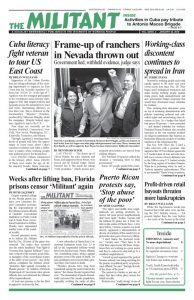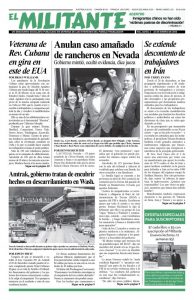Tens of thousands of iron ore miners and steelworkers toil in the industrial city of Kryvyi Rih in the center of Ukraine, working for ArcelorMittal, Evraz and other companies. For years they have fought to build and strengthen independent unions that can take on the bosses and their backers in the government.
Over the past year there have been a series of mine occupations and other protests, demanding payment of wage arrears, raises and safer working conditions. Last May members of the Independent Trade Union of Miners of Ukraine (NPGU) at three of the main mines in Kryvyi Rih — Evraz Sukha Balka, ArcelorMittal and the Kryvyi Rih Iron Ore Combine — stayed underground and rallied in the streets for days until they won a 50 percent wage increase.
In an interview Dec. 31, Yuri Samoilov, head of the union in Kryvyi Rih, and Sergei Barabashuk, leader of the union at the Evraz mine, told the Militant that the union is growing and gaining respect in the region.
There have been a number of mine sit-ins and battles across the country, especially around unpaid wages. In October miners stayed underground, stopping production, at the “Rodinska” mine in Donetsk province, and went on strike at the “Volynvyhillia” mine on the Polish border in the far west.
Because of the difficult conditions miners face, and because of the role of the NPGU in leading fights for higher wages, there is growing support for the union in the region, Samoilov said.
This has led to attacks on the union by the bosses. At the “Ingulska” uranium mine in Kropyvnytskyi, northwest of Kryvyi Rih, 94 miners have been sued by the company after they stayed underground to demand a raise in November.
“The union has been involved in a growing number of strikes and court cases,” Barabashuk told the Militant. “We’re winning many of these fights.”
Because of this, Barabashuk has come under attack. After the May strike, he noticed that he was being followed. He was assaulted by a pro-company miner, who is still working there.
“The company put a camera up outside the union office in the mine,” he said. “They told me it was for my protection. But the fact is it takes pictures of every miner who comes to talk to me, to discuss moves against workers by management. We demand they take it away.”
Other workers report they have been searched and interrogated by bosses asking them about union activities and about Barabashuk.“We want to let workers around the world know about this, so we are in a better position to defend ourselves,” he said.
There is still a sizable miners’ union in Ukraine that was the official government union before the Stalinist regime in the country collapsed in 1990. “It tries to make things go smoothly for the bosses at Evraz and has made it harder for workers to fight,” Barabashuk said.
“There are 3,000 workers in the mine,” he said. “A layer is newly hired, without previous experience with a union. The union explains we want to improve their lives. We say there are thousands like them across Ukraine and around the world.
“We send our greetings to workers in the U.S.,” he said.

